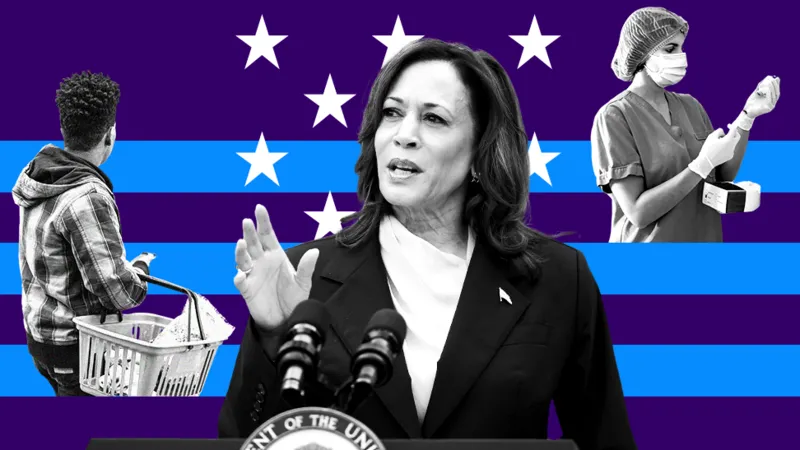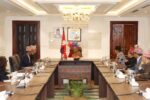Days before the Democratic National Convention, Vice-President Kamala Harris is riding high on a wave of favourable polls and energetic rallies.
But beyond the good vibes, where does the presumptive Democratic presidential nominee stand on key issues?
Although she has yet to release a comprehensive platform, her time as a California senator and prosecutor, her 2020 bid for the presidency and role in the White House as vice-president give hints as to where Ms Harris stands on a number of policies.
Over the years, some of her positions have shifted and some have said that she has struggled to define herself.
To get a better understanding of what her policy agenda now might look like, BBC News reviewed Ms Harris’ recent speeches and public statements as a 2024 candidate, her record as vice-president and her political history as a 2020 presidential candidate, California senator and prosecutor.
Ms Harris’s campaign told the BBC that the candidate’s most recent statements best reflect her intentions if elected president.
“Vice President Harris will build on the Biden-Harris Administration’s historic agenda that beat Big Pharma, created nearly 16 million jobs, and delivered on the first bipartisan gun safety legislation in three decades,” Harris campaign spokesperson Kevin Munoz said in a statement.
Here are Ms Harris’ positions on 10 key issues.
Economy
As a senator, Ms Harris championed a number of progressive policies, including paid family leave, affordable housing and free tuition for low-and-middle income families.
As vice-president, she has been Mr Biden’s partner in passing major economic legislation – regularly labelled “Bidenomics” – which included major investments in infrastructure and green energy.
But with inflation and high interest rates continuing to bedevil American wallets, polls have shown that the economy continues to be top of mind for many voters.
On Friday, Ms Harris released her economic plan, including mortgage assistance for first-time homebuyers, a tax credit for parents of newborns and bans on price gouging at the grocery store to help target inflation.
And like her opponent, former US President Donald Trump, she has come out against taxing tips.
“As president, I will be laser focused on creating opportunities for the middle class that advance their economic security, stability and dignity. Together, we will build what I call an opportunity economy,” she said Friday.
Immigration
Ms Harris’s position on the border has changed from when she first ran for office. In 2020, while campaigning for the Democratic presidential nomination, she held fairly progressive positions – such as promising to close down immigration detention centres.
In 2021, Mr Biden asked Ms Harris to oversee the diplomatic effort to address the immigration issues on the US southern border.
She was not – as characterised by many Republicans – a “border csar”, but instead worked with Central American countries on the “root causes” of why people there were fleeing to the US.
As part of that effort, she announced in 2023 that she had helped raise about $3bn – largely from private companies – to invest in communities in the region, hoping to provide opportunities that would make immigrating to the US less attractive.
Earlier this year, she aided the effort to pass a hardline bipartisan border security deal that would have included hundreds of millions of dollars for border wall construction.
But Trump helped kill the deal, accusing Biden’s border policies of causing “death, destruction, and chaos in every American community”.
Her campaign said that, if she were elected president, she remains committed to “bipartisan solutions to strengthen border security”.
Abortion
Ms Harris has long supported women’s right to an abortion.
She played a key role in the Biden campaign’s effort to make abortion rights central to the 2024 election, and she has long advocated for legislation that would enshrine reproductive rights nationwide.
That position has not changed.
“When Congress passes a law to restore reproductive freedoms, as president of the United States, I will sign it into law,” she said at a rally for her 2024 campaign in Atlanta, Georgia.
She was the first vice-president to visit an abortion clinic, and she toured the country after the US Supreme Court overturned Roe v Wade in 2022 to speak about the growing number of abortion bans in the US – often framing the issue as one about personal freedom.
Powerful reproductive rights advocacy groups, such as Emilys List and Reproductive Freedom for All, have officially endorsed Ms Harris since she started her presidential run.
Nato and Ukraine aid
While much of her early career focused on the state of California, since going to Washington as a senator in 2017, Ms Harris has become more involved on the global stage.
As senator, she traveled to Afghanistan, Iraq, Jordan and Israel.
As vice-president, she has met 150 world leaders and visited 21 countries.
She attended the Munich Security Conference in the past year, and she delivered remarks in support of Nato that denounced isolationism and vowed to support Ukraine “for as long as it takes”. She also represented the US in June at the “peace conference” convened by Ukraine in Switzerland where she reaffirmed US support to Kyiv.
Within 48 hours of her candidacy becoming public, 350 leading US foreign policy and national security experts – largely Democrats – released a letter endorsing her as the “best qualified person” to lead the country in international affairs.
Israel-Gaza War
Ms Harris has been a longtime advocate for a two-state solution.
As vice-president, she was more open to criticising Israel during the Israel-Gaza war than Mr Biden.
She was one of the first members of the administration to call for an “immediate cease-fire”, raised concerns over the “humanitarian catastrophe for Palestinians” and charged Israel with ending the conflict.
She held what she called “frank and constructive” talks with Israeli Prime Minister Benjamin Netanyahu when he visited Washington in July.
As the presumptive Democratic candidate, she said she told Mr Netanyahu that she had “serious concerns” about casualties in Gaza and that the way Israel defended itself mattered.
“It is time for this war to end,” she said after face-to-face talks at the White House.
She does not support an arms embargo on Israel, however, as some on the US left have called for.
Her national security adviser, Phil Gordon, said on X that she “has been clear: she will always ensure Israel is able to defend itself against Iran and Iran-backed terrorist groups”.
Taxes









Comment